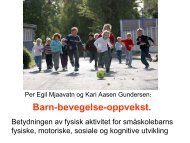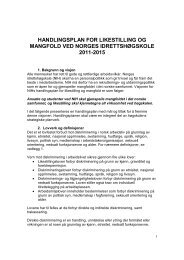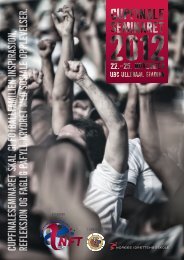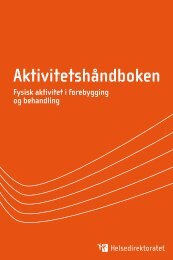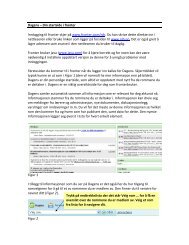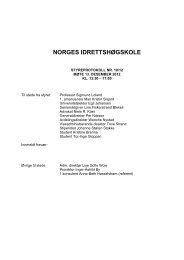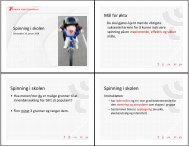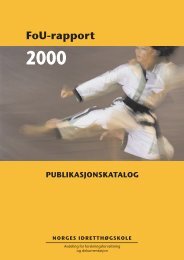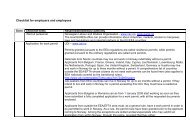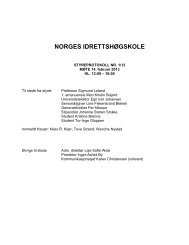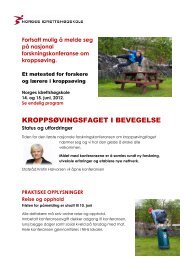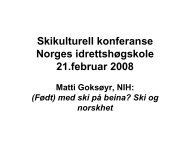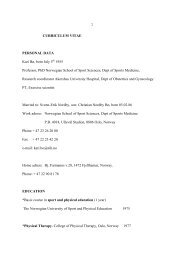Norwegian School of Sport Sciences - Norges idrettshøgskole
Norwegian School of Sport Sciences - Norges idrettshøgskole
Norwegian School of Sport Sciences - Norges idrettshøgskole
Create successful ePaper yourself
Turn your PDF publications into a flip-book with our unique Google optimized e-Paper software.
<strong>Norwegian</strong> <strong>School</strong><br />
<strong>of</strong> <strong>Sport</strong> <strong>Sciences</strong><br />
Vision<br />
<strong>Norwegian</strong> <strong>School</strong> <strong>of</strong> <strong>Sport</strong> <strong>Sciences</strong> is a leading<br />
international institution for research and education in<br />
excercise and sport sciences.<br />
<strong>Norwegian</strong> <strong>School</strong> <strong>of</strong> <strong>Sport</strong> <strong>Sciences</strong> (NSSS) is a<br />
specialized university with a national responsibility<br />
for research and higher education focused on exercise<br />
and sport sciences.<br />
The <strong>School</strong> was established in 1968 and is today an internationally<br />
recognized research and teaching institution across<br />
the range <strong>of</strong> sport sciences. NSSS has 1400 students enrolled in<br />
bachelor, master, PhD and part-time studies and more than<br />
200 employees.<br />
At NSSS sport is taken to encompass different forms <strong>of</strong> human<br />
movement including organised sports, physical education,<br />
outdoor recreation, games, dance, exercise and training. The<br />
<strong>School</strong> conducts research in a highly active and vibrant research<br />
milieu based on a broad spectrum <strong>of</strong> disciplines, subjects<br />
and activities. NSSS’ research provides a basis for courses <strong>of</strong><br />
study that cover society’s need for expertise in the field <strong>of</strong><br />
sport. The study programmes educate students to work in<br />
schools, health care and government agencies, and in research.<br />
The education also prepares the students to work<br />
within sport management and coaching within organised<br />
sport.<br />
The <strong>School</strong> has an idyllic setting beside the Sognsvann Lake<br />
in Oslo and in the immediate vicinity <strong>of</strong> an area <strong>of</strong> outstanding<br />
natural beauty. It is within a short bicycle ride to the city<br />
centre <strong>of</strong> Oslo. The surroundings create an excellent setting for<br />
physical activities and sport.
Organisational<br />
structure<br />
Organisational structure<br />
The <strong>School</strong> is governed by a Board that is led by the<br />
Rector. The Rector is the academic head <strong>of</strong> the <strong>School</strong>.<br />
He/she is elected for four years and can be re-elected for<br />
four years more. The management <strong>of</strong> the <strong>School</strong> is divided<br />
between the Rector who is responsible for the academic<br />
activities and the Director who is responsible for the administration.<br />
In addition to the Rector, the Board consists <strong>of</strong><br />
four external members, four elected representatives for the<br />
employees and two student representatives.
Research and Education<br />
NSSS academic activities are divided between five<br />
departments and one centre:<br />
• Department <strong>of</strong> Physical Performance<br />
The department’s area <strong>of</strong> academic expertise involves the factors<br />
affecting physical performance and the effect <strong>of</strong> training.<br />
The department has responsibility for teaching and research<br />
in subjects based on physics, biomechanics, biochemistry, cell<br />
biology, anatomy and physiology together with the sports <strong>of</strong><br />
skiing, swimming, orienteering and gymnastics. The department<br />
has a special responsibility for one <strong>of</strong> NSSS’ priority areas<br />
within activities research: physical training and kinetics with<br />
emphasis on ski sports.<br />
• Department <strong>of</strong> Coaching and Psychology<br />
The department’s area <strong>of</strong> academic expertise are coaching<br />
and sport psychology. <strong>Sport</strong> psychology activities are centered<br />
around both sport psychology, health and exercise psychology.<br />
The primary research areas are with the motivational determinants<br />
<strong>of</strong> sport participation and exercise adherence, the impact<br />
<strong>of</strong> the sport experience on children, applying psychology to<br />
elite performance, and the mental (or psychological) benefits <strong>of</strong><br />
exercise and physical activity. Studies and research in coaching<br />
are based on pedagogy and psychology. The department seeks<br />
to integrate competence in activities such as ball games and<br />
athletics with relevant sport science knowledge, and has a<br />
special responsibility for one <strong>of</strong> NSSS’ priority areas within<br />
activities research: coaching <strong>of</strong> ball sports.<br />
• Department <strong>of</strong> Physical Education<br />
The department is responsible for the subjects <strong>of</strong> physical<br />
education, adapted physical education and outdoor education.<br />
Teacher and instructor education in physical and outdoor<br />
education are the main areas <strong>of</strong> curricular provision. Studies in<br />
adapted physical education is organized in cooperation with<br />
Beitostølen Health <strong>Sport</strong>s Centre. The department’s educational<br />
research and development activities include projects within<br />
all these areas. A particular emphasis is put on various understanding<br />
<strong>of</strong> the learning in practise, and on the construction <strong>of</strong><br />
identity and gender in physical and outdoor education.
• Department <strong>of</strong> <strong>Sport</strong>s Medicine<br />
The department is responsible for education and research<br />
in sports medicine, which includes addressing the health<br />
benefits <strong>of</strong> exercise and regular physical activity, as well as<br />
potential negative consequences <strong>of</strong> exercise and sports participation,<br />
e.g. injuries, asthma, and eating disordes.<br />
The primary research areas within the department are;<br />
exercise and health related to women; physical activity and<br />
health; monitoring <strong>of</strong> physical activity and physical fitness in<br />
the population; sports injury prevention, and active rehabilitation<br />
<strong>of</strong> musculoskeletal disorders. The department includes<br />
two research centers, the Oslo <strong>Sport</strong>s Trauma Research Center<br />
and the <strong>Norwegian</strong> Center for Active Rehabilitation.<br />
Research emphasis is put on sport, organisations and politics;<br />
sport, identity and values; and sport, gender and culture.<br />
Methodological approaches include both the study <strong>of</strong> social<br />
and insitutional structures, as much as <strong>of</strong> individual experience<br />
and actions.<br />
• Centre <strong>of</strong> Applied Research<br />
Through the Centre <strong>of</strong> Applied Research, NSSS meets external<br />
needs and interests in our field by <strong>of</strong>fering expertise, practical<br />
competence and knowledgebased services.<br />
• Department <strong>of</strong> Cultural and Social Studies<br />
The department’s areas <strong>of</strong> academic competence are sport<br />
sociology, history <strong>of</strong> sport, philosophy <strong>of</strong> sport, sport<br />
management and social aspects <strong>of</strong> physical activity and<br />
the disabled. The department conducts teaching in sport<br />
management, in sport from the perspectives <strong>of</strong> the social<br />
sciences and humanities, and in adapted physical activity.
Programmes<br />
The <strong>Norwegian</strong> <strong>School</strong> <strong>of</strong> <strong>Sport</strong> <strong>Sciences</strong> <strong>of</strong>fers courses <strong>of</strong> study<br />
at the Bachelor, Masters and Doctoral level. Every level <strong>of</strong><br />
education is <strong>of</strong> high international quality and developes the<br />
competence <strong>of</strong> students that is relevant for vocational, social<br />
and academic achievement. The requirements for admission<br />
to the first year are basic entrance requirements for admission<br />
to <strong>Norwegian</strong> universities together with a successful physical<br />
skills entrance test. The first year involves common studies<br />
for all the Bachelor courses. Subsequently, seven Bachelor<br />
programmes build upon the first year:<br />
• Coaching<br />
• Outdoor Education<br />
• Physical Activity and Health<br />
• Physical Education - Teacher Education<br />
• <strong>Sport</strong> Biology<br />
• <strong>Sport</strong>, Individual and Society<br />
• <strong>Sport</strong> Management<br />
The <strong>School</strong> also <strong>of</strong>fers one year studies at the bachelor level.<br />
Academic preparation can be further developed at the<br />
Masters level where students have a range <strong>of</strong> different study<br />
modules from which to choose.<br />
The PhD programme is typically <strong>of</strong> three year duration and<br />
builds upon a Masters degree in sport science or other<br />
relevant Master programmes <strong>of</strong> study.<br />
About half <strong>of</strong> the students at NSSS are part-time students.<br />
The Part-time courses consist <strong>of</strong> modules within Outdoor Life,<br />
Physical Education and Fitness. A series <strong>of</strong> short courses and<br />
seminars are also arranged, <strong>of</strong>ten in association with other<br />
research environments or with sports foundations or sporting<br />
organisations.
Internationalization<br />
International student exchange is an important aspect <strong>of</strong><br />
academic life at The <strong>Norwegian</strong> <strong>School</strong> <strong>of</strong> <strong>Sport</strong> <strong>Sciences</strong>.<br />
<strong>Norwegian</strong> students are encouraged to study abroad and<br />
opportunities are easy available for international students to<br />
spend a semester or two at NSSS. International programmes<br />
such as Nordplus or Erasmus simplify the arrangements for<br />
student exchange.<br />
The <strong>School</strong> has Erasmus agreements with Universities in the<br />
Nordic countries, Belgium, France, Greece, The Netherlands,<br />
Slovenia, Great Britain, Switzerland, Germany, Spain and the<br />
Czech Republic. NSSS students also have the opportunity to<br />
study in Canada and USA. NSSS has entered into a collaboration<br />
agreement with the University <strong>of</strong> California, Berkeley,<br />
that facilitates research visits for its doctoral students and<br />
faculty. NSSS is also a member <strong>of</strong> a consortium which <strong>of</strong>fers<br />
an Erasmus Mundus Master in Adapted Physical Activity. The<br />
programme is a one year course which leads to a joint Masters<br />
degree. The school <strong>of</strong>fers English courses at the Bachelor level<br />
in outdoor education.<br />
NSSS Faculty members collaborate in diverse international<br />
research projects and are active contributors to international<br />
sport research through numerous scientific articles, books and<br />
papers at scientific congresses.<br />
In 2009, the school will arrange one <strong>of</strong> the largest annual<br />
sport science conferences in the world (European College <strong>of</strong><br />
<strong>Sport</strong> Science).
<strong>Norges</strong> idrettshøgskole<br />
The <strong>Norwegian</strong> <strong>School</strong> <strong>of</strong> <strong>Sport</strong> <strong>Sciences</strong><br />
P.O Box 4014 Ullevål Stadion<br />
Sognsv.220 NO – 0806 Oslo<br />
Tel (+47) 23 26 20 00<br />
postmottak@nih.no<br />
www.nih.no



